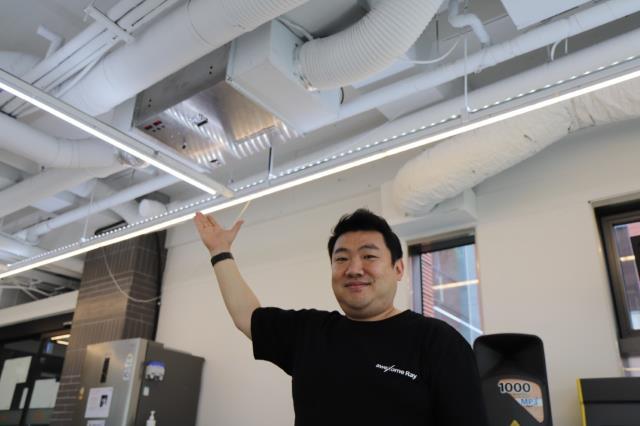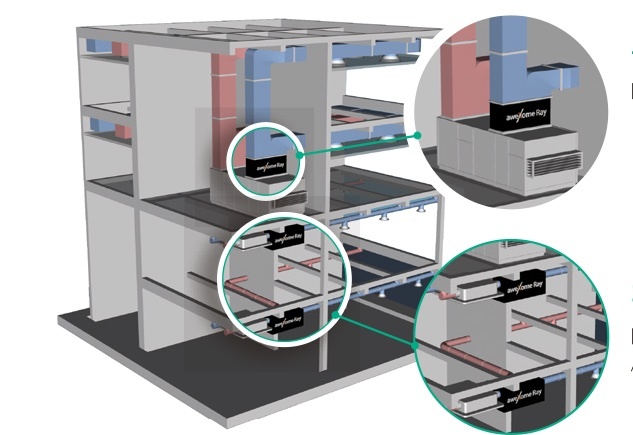[Herald Interview] South Korean startup AweXomeRay develops next-generation X-ray technology for fresh, healthy air
By Park Ga-youngPublished : June 28, 2021 - 09:23
For decades, X-rays have been mostly used for medical purposes such as checking for bone fractures, pneumonia and breast cancer.
South Korean entrepreneur Gihm Se Hoon, however, uses the extreme ultraviolet (EUV) for air purification and sterilization, which has become an important technology amid worries over particulate pollution, and of course, floating bacteria and viruses, such as the coronavirus.
The founder and CEO of aweXome Ray and his fellow scientists have commercialized an electrostatic precipitator-type air purifier powered. The equipment, which can be installed in closed spaces such as buildings, factories, underground and even in submarines, removes air pollutants rapidly without generating ozone, he said. Unlike traditional air purifiers, aweXome Ray’s equipment has no filters. It purifies and sterilizes the air simultaneously, he says.
South Korean entrepreneur Gihm Se Hoon, however, uses the extreme ultraviolet (EUV) for air purification and sterilization, which has become an important technology amid worries over particulate pollution, and of course, floating bacteria and viruses, such as the coronavirus.
The founder and CEO of aweXome Ray and his fellow scientists have commercialized an electrostatic precipitator-type air purifier powered. The equipment, which can be installed in closed spaces such as buildings, factories, underground and even in submarines, removes air pollutants rapidly without generating ozone, he said. Unlike traditional air purifiers, aweXome Ray’s equipment has no filters. It purifies and sterilizes the air simultaneously, he says.

With the technology, Gihm believes that the company can not only eliminate fine dust in the air, but also create a healthier and greener environment. And the growing interest in green buildings is a golden opportunity for the company.
A high-rise building sold by Igis Asset Management early this year is a prime example. The local management company purchased the building in Yeouido for 212 billion won three years ago, renovated for LEED certification, and sold it at 336 billion won this year.
LEED or Leadership in Energy and Environmental Design is a system of rating and certifying sustainable buildings.
“Building owners use green remodeling as a strategy to improve property value. For this case, the building’s value went up significantly because it was certified as a LEED Gold, the second-highest rating of the system,” said Gihm in an interview with The Korea Herald. “Although aweXome Ray’s air purification was installed on just one floor, (the asset management company) adopting our innovative technology (to its property) has become the talk of the town for its contribution in turning it into an internationally certified green building.”
Kakao Ventures and Seoul Techno Holdings participated in the first round funding as well as the second round, which was also joined by D.camp and Base Investment. Combining the first two rounds, the company raised 2.2 billion won. In the Series A funding that was completed in June 2020, the company raised 3 billion won from investors and 3 billion won worth of convertible bonds from the state-run Korea Development Bank.
This year has been a remarkable for the company’s growth. The company is mulling to supply its air purifying and sterilizing technology to the headquarters of some Korean IT companies this summer. AweXome Ray also worked with a vaccine center, a hospital and a local health center in Hadong, South Gyeongsang Province, to manage air quality there. Turning those public facilities into green buildings was carried out as part of its Green Unicorn project, the CEO said.
AweXome Ray was selected as one of the first Green Unicorn candidates by the Ministry of Environment in 2020. The Green Unicorn is a project run by the government dedicated to implementing green industry standards and backing promising early-stage companies.

“We have been supplying our products for what we call a test process by installing them for a part of (a client’s) buildings. But starting from this year we aim to cover all parts of a building, from which we will generate revenue not only in Korea but also overseas markets,” said Gihm.
The company has partnered with Posco International, a trading unit under steel giant Posco, to expand its sales to construction companies overseas. It has also made a proposal to a federal rail operator in Switzerland, in cooperation with Kotra, state-run trade promotion agency.
The market for air pollution removal equipment in Korea is estimated at 4 trillion won with an annual average growth of 11.7 percent, he said, citing a report published last year.
“Demand for clean air may surge rapidly not only in Korea but also overseas, such as China and Taiwan. We see considerable market demand in China estimated at least $ 200 million annually for products to be used for its vast numbers of subway stations.”
The former researcher specializing in X-ray technology said he gave up a six-figure salary at Samsung Electronics and founded three companies, including an education tech company before he finally started aweXome Ray.
Launched in 2018 as a startup, it is one of a few hardware companies aiming to become a unicorn.
“My mission has always been clear -- to become a unicorn as a hardware company and with technology that is the brainchild of a college lab,” he said.
“I was frustrated to see college lab technologies that ended up (stuck) at the labs, without being given a chance to be commercialized. I wish I could set a new example of becoming a hardware unicorn that goes public,” he added.
To get that billion-dollar valuation, the company should ramp up efforts to protect intellectual properties, the CEO said.
So he spent the first year quietly applying for local and overseas patents, and the company secured nine domestic patents, all of which are protected overseas via the Patent Cooperation Treaty, and five overseas patents in Taiwan and the US.
By securing exclusiveness of aweXome Ray’s technology, the company has been enjoying a few opportunities.
Gihm thinks that his company is in line with South Korea’s move to reduce its dependence from foreign technology.
And most importantly, the pandemic has given an opportunity for the company to prove its technology’s role in fighting airborne-viruses.
“It is impossible to test whether the aweXome Ray equipment can kill the coronavirus, but we can assume that it might kill the virus because it kills others,” he said. “South Korea has only one test that certifies one product’s efficiency in killing viruses. AweXome Ray showed 98.4 percent efficacy in killing viruses.”
When asked about plans for the future, Gihm said the company plans to introduce seawater sterilization products next year.
“Ultimately, we want to become the leading next generation x-ray technology developer that can be applied to almost everything.”
The company has partnered with Posco International, a trading unit under steel giant Posco, to expand its sales to construction companies overseas. It has also made a proposal to a federal rail operator in Switzerland, in cooperation with Kotra, state-run trade promotion agency.
The market for air pollution removal equipment in Korea is estimated at 4 trillion won with an annual average growth of 11.7 percent, he said, citing a report published last year.
“Demand for clean air may surge rapidly not only in Korea but also overseas, such as China and Taiwan. We see considerable market demand in China estimated at least $ 200 million annually for products to be used for its vast numbers of subway stations.”
The former researcher specializing in X-ray technology said he gave up a six-figure salary at Samsung Electronics and founded three companies, including an education tech company before he finally started aweXome Ray.
Launched in 2018 as a startup, it is one of a few hardware companies aiming to become a unicorn.
“My mission has always been clear -- to become a unicorn as a hardware company and with technology that is the brainchild of a college lab,” he said.
“I was frustrated to see college lab technologies that ended up (stuck) at the labs, without being given a chance to be commercialized. I wish I could set a new example of becoming a hardware unicorn that goes public,” he added.
To get that billion-dollar valuation, the company should ramp up efforts to protect intellectual properties, the CEO said.
So he spent the first year quietly applying for local and overseas patents, and the company secured nine domestic patents, all of which are protected overseas via the Patent Cooperation Treaty, and five overseas patents in Taiwan and the US.
By securing exclusiveness of aweXome Ray’s technology, the company has been enjoying a few opportunities.
Gihm thinks that his company is in line with South Korea’s move to reduce its dependence from foreign technology.
And most importantly, the pandemic has given an opportunity for the company to prove its technology’s role in fighting airborne-viruses.
“It is impossible to test whether the aweXome Ray equipment can kill the coronavirus, but we can assume that it might kill the virus because it kills others,” he said. “South Korea has only one test that certifies one product’s efficiency in killing viruses. AweXome Ray showed 98.4 percent efficacy in killing viruses.”
When asked about plans for the future, Gihm said the company plans to introduce seawater sterilization products next year.
“Ultimately, we want to become the leading next generation x-ray technology developer that can be applied to almost everything.”



















![[Today’s K-pop] BTS pop-up event to come to Seoul](http://res.heraldm.com/phpwas/restmb_idxmake.php?idx=642&simg=/content/image/2024/04/17/20240417050734_0.jpg&u=)